by Naomi L. | May 19, 2017 | J.C. Wolfe's Writing, Poetry |
All that others see
Contradicts the truest love
Hidden in my heart
Plain dark irises
Conceal the sweet perfection
Only I can see
Wonder to behold
All the beauty I have found
In your lovely eyes
My responses to Ronovan Writes‘ Weekly Haiku Challenge #146: Behold & Eye. I know I’m late again, but I just couldn’t resist this theme either! Thanks for the prompt, Ronovan!
by Naomi L. | May 17, 2017 | Blog, Creative Writing |
Remember that list of redundant phrases I shared on my blog a few weeks ago? Well, here are some more examples of phrases collected from the Elevate – Brain Training app that should be edited for brevity. Sometimes it seems like we never run out of these common redundancies, doesn’t it? One of the many reasons editing will always be a necessity for writers!
So for your reference, here are 14 more redundant phrases you should simplify during your editing phase. Enjoy!

Edit to: “If you buy one shirt, you’ll get another free.”
1) Absolutely crucial: Crucial already implies that something is absolutely important. Simplify “absolutely crucial” to “crucial”.
2) Added bonus: Bonus indicates something extra, making the word “added” unnecessary. Simplify “added bonus” to “bonus”.
3) ATM machine: ATM stands for “automated teller machine”, so the word “machine” is redundant. Simplify “ATM machine” to “ATM”.
4) Circle around: To circle already means to move all the way around something. Simplify “circle around” to “circle”.
5) Close proximity: Proximity already means the state of being close. Simplify “close proximity” to “proximity”.
6) First introduced: Introduced already indicates something that was seen or shown for the first time. Simplify “first introduced” to “introduced”.
7) For free: Free by itself means no charge, so the preposition “for” is unnecessary. Simplify “for free” to “free”.
8) Honest truth: Both the words “honest” and “truth” indicate an adherence to facts and reality. Simplify “honest truth” to “truth”.
9) Necessary prerequisite: A prerequisite, by definition, is a requirement, so the word “necessary” is redundant. Simplify “necessary prerequisite” to “prerequisite”.
10) New discovery: Discovery already implies that a finding is new. Simplify “new discovery” to “discovery”.
11) Temper tantrum: A tantrum is an outburst of anger, so the word “temper” (in the sense “an angry state of mind”) is redundant. Simplify “temper tantrum” to “tantrum”.
12) Temporary reprieve: A reprieve is short-term relief from something unpleasant, so the word “temporary” is unnecessary. Simplify “temporary reprieve” to “reprieve”.
13) Various differences: Differences are ways in which things vary, making the word “various” redundant. Simplify “various differences” to “differences”.
14) Visible to the eye: Visible already means able to be seen with the eyes. Simplify “visible to the eye” to “visible”.
Do you use any of these redundant phrases in your writing? What others would you add to this list?
by Naomi L. | May 15, 2017 | Blog, Word of the Week |
Word: materfamilias
Pronunciation: may-tər-fə-MI-lee-əs / mah-tər-fə-MI-lee-əs
Part of Speech: noun
Definition: the female head of a family or household
Source: Oxford Dictionaries
Happy belated Mother’s Day to those of you who celebrated this weekend! Here’s an interesting new word for mothers who run a household. I learned today’s vocabulary word after looking up synonyms for “mother”, and since I’d never seen or heard it before, I knew I had to write about it for my Word of the Week segment. If you celebrated Mother’s Day yesterday, chances are you either are or know a “materfamilias”!
A “materfamilias” is the female head of a household or family. The word comes from the Latin phrase mater familias, meaning “mother of the household”. This phrase comprises the noun mater “mother” and the noun familia “family”.
Fun fact: the plural form of this word is “matresfamilias”. Though I find it highly interesting for its Latin origin, I doubt I’d be able to find a place for the word “materfamilias” in any of my writing outside of poetry. Given how advanced and archaic it sounds, writers of historical nonfiction would likely find the most use for it, but it may also prove useful to fiction writers who tend to overuse the word “matriarch” in their stories. If you write main characters who are mothers and/or female heads of their households, “materfamilias” may be a good word to add to your vocabulary!
What are your thoughts on this word? Any suggestions for future “Word of the Week” featured words?
by Naomi L. | May 12, 2017 | J.C. Wolfe's Writing, Poetry |
I don’t know how you managed
To put up with me so long,
To endure my moody outbursts
As you taught me right from wrong.
I don’t know how you always
Knew exactly what to say
To help me through my problems
‘Til we made them go away.
I don’t know how you managed
To support me all those years,
To encourage all my dreams
And protect me from my fears.
But I’m thankful that you did it,
For without you there for me,
I could never be the person
That I always hoped to be.
So I thank you for your patience
To stick with me to the end,
And I thank you for your wisdom
As a mentor and a friend.
I thank you for your kindness,
A true blessing from above.
But most of all, I thank you
For your never-ending love.
To be an awesome parent
Is the most challenging task,
Yet you’re still the greatest mother
For whom anyone could ask.
I don’t know how you do it,
But I’m really glad you do.
Happy Mother’s Day to you, Mom!
Love, your daughter who loves you!
Happy Mother’s Day to my awesome mom! Thank you for all the love and support you’ve given me my whole life! I love you!
by Naomi L. | May 10, 2017 | Blog, Creative Writing |
Mother’s Day is this Sunday, and to mark the occasion, I thought it would be fun to share a list of some favorite moms in fiction! Mothers are undeniably among the most important figures in family dynamics, so it’s no surprise that fictional mothers also play a highly influential role in the lives of other characters in a story. There are so many famous mothers in literature, television, and film that it was hard to narrow this list down, but at last I managed to put together a post on the memorable moms in my favorite stories. They each have different strengths and weaknesses, but in the end, they’re all loving and dedicated parents!
So to celebrate the upcoming holiday, here is a list of my five favorite mothers in fiction. Enjoy, and Happy Mother’s Day!
1) Molly Weasley (The Harry Potter series)
NOT MY DAUGHTER, YOU BITCH! – Molly Weasley to Bellatrix Lestrange, whose Killing Curse had just narrowly missed Ginny
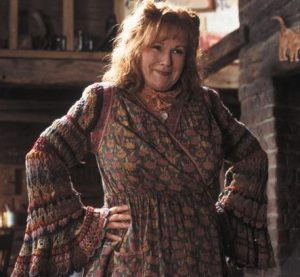 Molly Weasley, Ron’s mother in the Harry Potter series, may well be one of my favorite moms in all of literature. Not only has she raised seven children (and done a fine job of it too), but her maternal instincts are so strong that she extends her nurturing love to her youngest son’s best friends. Molly makes perfectly clear to Harry and Hermione that they’re always welcome in her home, and within moments of their first meeting, she quickly becomes to Harry the mother figure he never had growing up. Mrs. Weasley is proof that whether a witch or a Muggle, a mother will do anything for her children: while she runs a tight household and never hesitates to keep her mischievous sons in check, she is so fiercely protective of her children that she willingly steps between them and Death itself (namely Death Eater Bellatrix Lestrange) to keep them safe. The ideal mix of loving parent and badass witch, Molly Weasley is truly everyone’s favorite magical mom!
Molly Weasley, Ron’s mother in the Harry Potter series, may well be one of my favorite moms in all of literature. Not only has she raised seven children (and done a fine job of it too), but her maternal instincts are so strong that she extends her nurturing love to her youngest son’s best friends. Molly makes perfectly clear to Harry and Hermione that they’re always welcome in her home, and within moments of their first meeting, she quickly becomes to Harry the mother figure he never had growing up. Mrs. Weasley is proof that whether a witch or a Muggle, a mother will do anything for her children: while she runs a tight household and never hesitates to keep her mischievous sons in check, she is so fiercely protective of her children that she willingly steps between them and Death itself (namely Death Eater Bellatrix Lestrange) to keep them safe. The ideal mix of loving parent and badass witch, Molly Weasley is truly everyone’s favorite magical mom!
2) Margaret “Marmee” March (Little Women)
Don’t you feel that it is pleasanter to help one another, to have daily duties which make leisure sweet when it comes, and to bear and forbear, that home may be comfortable and lovely to us all? – Mrs. March to her daughters after their week-long “experiment” in being idle
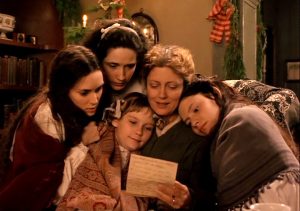 While Little Women centers on the various stories of four sisters growing up in 19th-century New England, it’s made clear in the beginning of the book that they all share a common aspiration: to live up to the example of their mother. Among women in classic literature, Mrs. March (known as “Marmee” by her daughters) is often held up as the image of the perfect mother: patient, compassionate, and highly principled. She works hard to support her family while her husband is at war, she cheerfully contributes to charity and the war effort, and she always has time to console her daughters no matter how busy she is. Yet Marmee does even more for her children by raising them all to be the best people they can possibly be, ensuring they’re all well educated and independent thinkers, encouraging them to marry for love instead of money, and always being there to offer them advice while still allowing them to learn from their own mistakes. With such a strong and loving mother to guide them, it’s no wonder the March sisters aspire to be such fine “little women”!
While Little Women centers on the various stories of four sisters growing up in 19th-century New England, it’s made clear in the beginning of the book that they all share a common aspiration: to live up to the example of their mother. Among women in classic literature, Mrs. March (known as “Marmee” by her daughters) is often held up as the image of the perfect mother: patient, compassionate, and highly principled. She works hard to support her family while her husband is at war, she cheerfully contributes to charity and the war effort, and she always has time to console her daughters no matter how busy she is. Yet Marmee does even more for her children by raising them all to be the best people they can possibly be, ensuring they’re all well educated and independent thinkers, encouraging them to marry for love instead of money, and always being there to offer them advice while still allowing them to learn from their own mistakes. With such a strong and loving mother to guide them, it’s no wonder the March sisters aspire to be such fine “little women”!
3) Queen Elinor of DunBroch (Brave)
Oh, my brave wee lass, I’m here. I’ll always be right here. – Elinor to a frightened young Merida
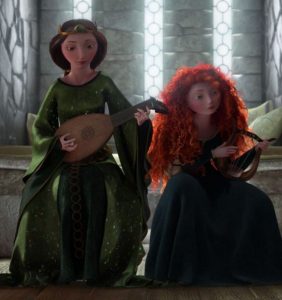 I’ve mentioned before that I often watch Brave and see my own relationship with my mother in Princess Merida’s relationship with hers. From the beginning of the film, Queen Elinor is determined to teach her daughter every possible lesson on proper princess behavior, from etiquette to diplomacy to compassion. Though at first it seems that her words never stick due to Merida’s strong will and stubbornness, it becomes clear toward the end of the story that no matter how many times they’ve butted heads over the years, Elinor’s wisdom did make an impression on her daughter after all. Merida mostly takes after her father on the outside, but it’s her mother’s lessons that help her calm the other royal families and ultimately get her through her trial. Elinor in turn also learns much about Merida throughout their adventure, enough to eventually shed her uptight persona and allow her daughter the freedom she’s always wanted to live her own life. A mother and daughter may not always see eye to eye, but the love between them is still one of the strongest bonds in the world!
I’ve mentioned before that I often watch Brave and see my own relationship with my mother in Princess Merida’s relationship with hers. From the beginning of the film, Queen Elinor is determined to teach her daughter every possible lesson on proper princess behavior, from etiquette to diplomacy to compassion. Though at first it seems that her words never stick due to Merida’s strong will and stubbornness, it becomes clear toward the end of the story that no matter how many times they’ve butted heads over the years, Elinor’s wisdom did make an impression on her daughter after all. Merida mostly takes after her father on the outside, but it’s her mother’s lessons that help her calm the other royal families and ultimately get her through her trial. Elinor in turn also learns much about Merida throughout their adventure, enough to eventually shed her uptight persona and allow her daughter the freedom she’s always wanted to live her own life. A mother and daughter may not always see eye to eye, but the love between them is still one of the strongest bonds in the world!
4) Lady Cora Crawley (Downton Abbey)
You are being tested. And you know what they say, my darling: being tested only makes you stronger. – Cora to Edith after the latter was left at the altar
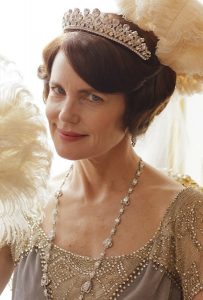 The Dowager Countess may be one of my favorite characters overall in Julian Fellowes’ popular period drama, but as far as mothers go, Lady Grantham probably sets the best example in Downton Abbey. Cora Crawley is the mother of three daughters, each with her own personality and aspirations, yet she always seems to know how best to handle each one—a difficult task given how the two elder sisters are always at each other’s throats. Generally sweet and willing to believe the best of anyone, Her Ladyship also proves to be a strong and highly capable woman: during World War I, she agrees to make Downton a convalescent home for recovering soldiers and works full-time to assist in running it, an experience that prepares her for her eventual position as President of Downton Hospital at the end of the series. She is quicker to embrace change than the rest of her family and is kind even to her servants, earning her immense respect among the staff of Downton. Overall, Cora is a loving motherly figure and, even as an American heiress and aristocrat in early 20th-century England, sets an exceptional example of a modern woman for her daughters!
The Dowager Countess may be one of my favorite characters overall in Julian Fellowes’ popular period drama, but as far as mothers go, Lady Grantham probably sets the best example in Downton Abbey. Cora Crawley is the mother of three daughters, each with her own personality and aspirations, yet she always seems to know how best to handle each one—a difficult task given how the two elder sisters are always at each other’s throats. Generally sweet and willing to believe the best of anyone, Her Ladyship also proves to be a strong and highly capable woman: during World War I, she agrees to make Downton a convalescent home for recovering soldiers and works full-time to assist in running it, an experience that prepares her for her eventual position as President of Downton Hospital at the end of the series. She is quicker to embrace change than the rest of her family and is kind even to her servants, earning her immense respect among the staff of Downton. Overall, Cora is a loving motherly figure and, even as an American heiress and aristocrat in early 20th-century England, sets an exceptional example of a modern woman for her daughters!
5) Mrs. Bennet (Pride and Prejudice)
When you have five daughters, Lizzie, tell me what else will occupy your thoughts, and then perhaps you will understand. – Mrs. Bennet to Elizabeth on why she thinks of nothing but marrying off her daughters
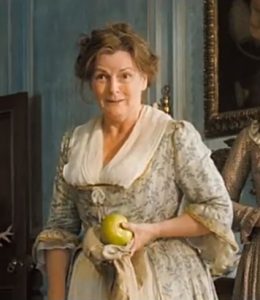 Yes, I know she’s not the best mother, or even a good mother on many counts, but given all the times she made me laugh, there was no way I could leave Mrs. Bennet off this list. Throughout Pride and Prejudice, Elizabeth’s father and younger sisters are embarrassing enough, but her mother proves by far the most humiliating of all. Foolish, noisy, and downright vulgar, Mrs. Bennet’s actions are solely driven by her desperation to marry her five daughters off to fine gentlemen, which often has the adverse effect of driving away the very suitors she tries to attract. Still, this simple woman provides much of the comedy in Jane Austen’s beloved novel, and for all the grief she gives her eldest daughters, she still manages to get what she wants in the end, gaining two wealthy sons-in-law and happy marriages for the most deserving of her children. She may go about it the wrong way, but readers can’t deny that her intentions, however misguided, are always good, even if just for a few laughs!
Yes, I know she’s not the best mother, or even a good mother on many counts, but given all the times she made me laugh, there was no way I could leave Mrs. Bennet off this list. Throughout Pride and Prejudice, Elizabeth’s father and younger sisters are embarrassing enough, but her mother proves by far the most humiliating of all. Foolish, noisy, and downright vulgar, Mrs. Bennet’s actions are solely driven by her desperation to marry her five daughters off to fine gentlemen, which often has the adverse effect of driving away the very suitors she tries to attract. Still, this simple woman provides much of the comedy in Jane Austen’s beloved novel, and for all the grief she gives her eldest daughters, she still manages to get what she wants in the end, gaining two wealthy sons-in-law and happy marriages for the most deserving of her children. She may go about it the wrong way, but readers can’t deny that her intentions, however misguided, are always good, even if just for a few laughs!
Who are your favorite fictional mothers? What other mothers in fiction would you add to this list?
Dedicated to my mom and all the other amazing mothers out there! Thank you for all your love, patience, and support! Happy Mother’s Day!


 Molly Weasley, Ron’s mother in the
Molly Weasley, Ron’s mother in the  While
While  I’ve
I’ve  The Dowager Countess may be one of my favorite characters overall in Julian Fellowes’ popular period drama, but as far as mothers go, Lady Grantham probably sets the best example in
The Dowager Countess may be one of my favorite characters overall in Julian Fellowes’ popular period drama, but as far as mothers go, Lady Grantham probably sets the best example in  Yes, I know she’s not the best mother, or even a good mother on many counts, but given all the times she made me laugh, there was no way I could leave Mrs. Bennet off this list. Throughout
Yes, I know she’s not the best mother, or even a good mother on many counts, but given all the times she made me laugh, there was no way I could leave Mrs. Bennet off this list. Throughout 
Recent Comments